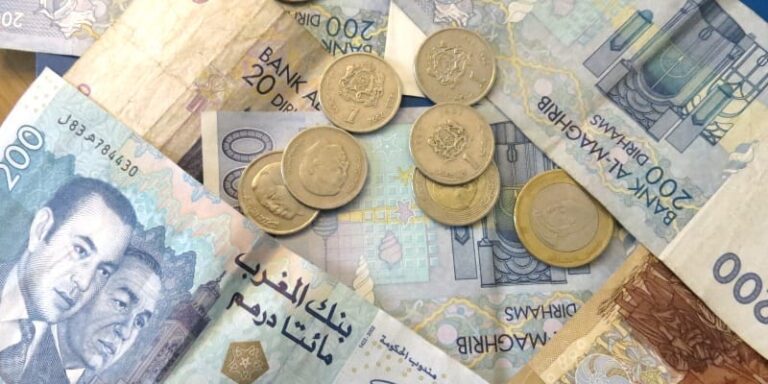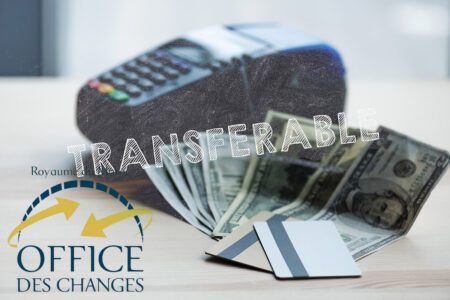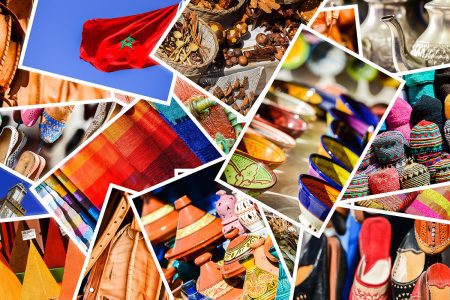This text was published in 2005 on the Mezgarne Oasis website, which has now disappeared. It has been updated, with more details on going through customs and buying and selling dirhams.
Please note: it only applies to non-residents!
A non-convertible dirham
Where can I buy dirhams?
The dirham is not convertible: you absolutely cannot change it or buy it outside Morocco. Within Morocco, you can buy as many dirhams as you like. As a non-resident, to sell your dirhams, particularly when you leave Morocco, you need to prove that they were bought with foreign currency or that they were subject to tax (which does not apply to you). You should therefore keep all the receipts for your purchases, whether at exchange counters or ATM withdrawals.
Importing foreign currency into Morocco
In practice, you are obliged to declare any foreign currency in excess of 100,000 dirhams (+/- €10,000) to customs on arrival if you wish to re-export it. (The official text specifies “in banknotes”, but I can’t imagine 100,000 dirhams in coins). And that’s just as well, because that’s also the amount above which you have to declare your cash when you leave the Schengen area. For Switzerland, the limit is 10,000 Swiss francs.
Selling your dirhams when leaving Morocco
You can change dirhams into foreign currency at the airport without needing to provide proof for small amounts, which can reasonably be considered as a leftover from your holiday expenses. There is no official amount, but above 5,000 dirhams, I think the customs officer will be a little fussy. Outside the airport (or ferry terminal), proof of payment is required regardless of the amount of the transaction.
Your dirhams are sold on presentation of your passport, and its number is recorded in the system.
If you come to Morocco often, you have the right to take a maximum of 2,000 dirhams in cash out of the country – and come back with it. You will be asked this question at customs.
Ten dirhams is one euro, more or less
This is the easy exchange rate used for ‘on the fly’ conversions when you are buying, or the one often imposed on you by hotels or shopkeepers when you want to pay directly in euros.
In reality, the exchange rate, regularly updated by the Central Bank and applied everywhere, is around 10.5 to 10.9 dirhams to the euro. So by paying directly in foreign currency, you leave a hefty commission. There are some traders who exchange at the official rate, but it’s more convenient to do it yourself.
The exchange rate has changed slightly since 2005, with the euro fluctuating between almost 11 dirhams and, ‘today’ (December 2021), 10.4 dirhams on the central markets. Of course, you won’t get such a good rate from a bank. On the same date, CFG charged one euro at 10.46 dirhams for an online transaction, and adds a commission of 1‰ for cash.
The rate of 1 euro = 10 dirhams is still easy, a good way to value your purchases.
Obtaining dirhams
You can easily change money on arrival at the airport. Later in your stay, you can choose between :
-
Direct withdrawal from the ATM
- Most large and medium-sized towns have at least one ATM. All international cards are accepted (Visa, Mastercard, Electro). Single withdrawals are limited to 4,000 dirhams on weekdays and 2,000 dirhams at weekends (although you can make two withdrawals in a row). Commissions depend on each bank, but are generally fairly low.
-
The automatic foreign exchange machine
- It will allow you to change notes outside the exchange office’s opening hours. In my experience, they are rather fickle when it comes to the quality of banknotes accepted or not. It’s more of a stop-gap solution.
-
The exchange office
- It’s a separate counter from the bank, with direct access and slightly shorter opening hours.
A Western Union emergency solution: in the event of theft, there’s no need to go back to the consulate. But you can have money sent to you almost immediately by Western Union (in many countries, in cooperation with the Post Office, or though their website). Commissions on international transfers are exorbitant, so reserve them for emergencies!
The right price for things
We mustn’t, on the pretext of pity or differences in living standards, pay too much for everyday things. You run the risk of ending up in a situation like Marrakesh, where Moroccans complain about the cost of living, which has been greatly increased by tourists.
When you give a tip, when you pay a shoeshine boy or a porter, don’t forget that money has a different value. A worker earns around 50 to 80 dirham a day.
So giving 1 or 2 dirhams is not ridiculous. Giving too much, for example, leads children to beg tourists, asking “1 euro, give me 1 euro”.
Some examples of prices:
- the guard who watches over your car: 2 dirham, 5 in busy places
- a bottle of water: 5-7 dirhams
- a tip in a small Moroccan restaurant: 2-5 dirhams
- a shoeshine: 2-3 dirhams (now 7-10)
- a taxi ride in town: 10-30 dirhams
- a bus or tram ticket: 5-7 dirhams
- a coffee (espresso, noss-noss or other) on a “normal” terrace: 10-15 dirhams
- a kilo of meat: 60-80 dirhams
(You can find out more about the cost of living in Morocco here).
Availability of ATMs
This is one of the areas where Morocco has come a long way since 2005!
The Moroccan postal bank, Al Barid Bank, has opened a large number of branches throughout the country, and the government is pushing for more people to have access to banking services, in particular by trying to distribute grants through a bank account. The opening of the auto-entrepreneur status has also played a role, as you absolutely have to have a bank account.
As a result, there are far more ATMs in small towns and villages, and far less risk of running out of cash.
The use of bankcards
It was still in its infancy when I wrote this article. Fifteen years and a coronavirus crisis later, it is much more widespread.
Theoretically, you can use it to pay at any petrol station, hotel, ‘chic’ or ‘tourist-oriented’ restaurant, museum, etc. You can also use it to pay for food and drink. You should still take the precaution of asking whether “it works”, as the cb sticker may have been applied a long time ago.
 A typo or syntax error? You can select the text and hit Ctrl+Enter to send us a message. Thank you! If this post interested you, maybe you can also leave a comment. We'd love to exchange with you !
A typo or syntax error? You can select the text and hit Ctrl+Enter to send us a message. Thank you! If this post interested you, maybe you can also leave a comment. We'd love to exchange with you !




